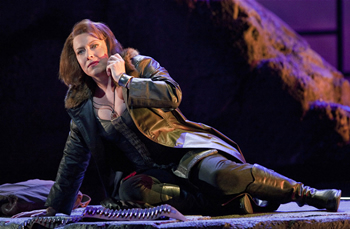Fifteen years ago, give or take a few months, NCSU’s J. Perry Watson had a dream – a dream that centered on British brass bands. He turned his dream into reality by persuading Capital Broadcasting and the A.J. Fletcher Foundation to provide operating support for what was to become the Triangle Brass Band, and in its earliest years, the fledgling group repaid the confidence of its backers by winning several notable prizes in national competitions. On November 3, in the Carolina Theatre’s Fletcher Hall, the ensemble celebrated its 15th anniversary. It was a gala evening in several respects, starting with the distinguished panel that provided a mini-course that might have been called Brass Bands 101–the speakers included UNC musicologist Tim Carter and incumbent TBB Music Director Michael Votta, Jr., along with various players who demonstrated the often-subtle sounds of their instruments.
The program itself, for which WRAL tuba player, punster and meteorologist Greg Fishel was the master of ceremonies, demonstrated the current band’s excellence during a program that hearkened back to the TBB’s earliest days. Founding Conductor David Reed returned from California, where he now lives and works, to lead James Curnow’s Fanfare , written for the North American British Brass Band Association, which he’d directed at the group’s first concert. Resident Conductor Brian K. Doyle led William Hines’ Festival Fanfare, a magnificent sample of the great Salvation Army Band tradition in which “All Creatures of our God and King” figures prominently. Votta himself then directed a sequence of numbers: a Fantasy on British Sea Songs (arr. Gordon Langford); the slow movement of Rodrigo’s Concierto de Aranjuez , arranged for flugelhorn by Kevin Bolton and played with astonishing skill and dexterity by Bob Peckham; and Philip Sparke’s three-section Year of the Dragon, notable for its complexity and its musical appeal, too.
The second half brought Doyle back for a paraphrase of the classic march Men of Harlech, composed by Edward German and arranged by Denis Wright. Former Music Director Jack Stamp, currently at Indiana University of Pennsylvania, returned to lead Edward Gregson’s brilliant Connotations .Votta then directed euphonium soloist Ed Mallett, of NCCU, and the ensemble in a richly rewarding reading of a fantasia on “Rule Britannia,” hatched by John Hartman and arranged by Tony Holtz. Hines’ treatment of “Amazing Grace” returned us to the Salvation Army’s literature, although in truth the evening never strayed very far from it. The grand finale was a Langford potpourri of famous British marches, in which “Rule Britannia” was again heard. The encore was a spirited reading of 76 Trombones – although there are only a handful of these instruments in the TBB.
Along the way, Fishel entertained the crowd and revealed many bits of the TBB’s quite remarkable history. Jim Goodmon, of Capital Broadcasting, who was apparently a brass player in high school, was given his axe, made up into a lamp (perhaps in the hope that he won’t apply for membership?). Bill Harris, who plays the baritone, is the TBB’s VP and was a member of the original board (and is thus a bona fide “plank-holder”), recognized the other players who have been associated with the group for the duration – John Enloe and Phil Herold, cornets, Wayne Vaughan, tenor horn, Jeanne Nelson, trombone, Harvey Turner, bass trombone, and Randy Guptill, euphonium. (We’ve culled these names from the handsome program, which is one of the best we’ve seen from any local group.) Bill Austin, the ensemble’s regular spokesperson, made a pitch for support and hawked CDs, the latest of which is reviewed in these pages (see our CD Review Archives). And at the end, Votta, a ten-year vet, paid tribute to his artists, noting, as another speaker had related, that this band is more than music–it’s a community. For more information on the TBB, including a list of its CDs and tapes, see http://www.trianglebrass.org/.
It’s hard to fault the program, which represented the roots of the TBB and exemplified some of the best literature of the British Brass Band tradition, but it seemed somewhat strange to this listener that “Rule Britannia” appeared several times while none of the great American national tunes-“The Star-Spangled Banner,” “America the Beautiful” or “God Bless America”-were played. One can only imagine how these might sound when given the TBB treatment. That reservation aside, this is truly a stellar ensemble, the membership of which encompasses some of our very best players. Roughly 40% of the members are teachers, actively involved in passing along their art to the next generation (which is, in and of itself, part of the Great Tradition). To a degree that suggests the old NBC Symphony, this group is heavily populated with important first-desk artists, among whom James Ketch, Chair of the UNC Music Department, was merely the most prominent.
Throughout the evening, there were many spectacular solos, but perhaps the most impressive single thing about this concert-and it’s not the first time we’ve noticed it-is that these brass players can and often do play SOFTLY. It CAN be done, even though many of these artists’ orchestral counterparts seem oblivious to this fact. The TBB’s roster of contributors includes lots of folks whose names won’t be recognized by mainstream classical people, but the group is worth the attention-and support-of serious music lovers of all stripes, and attendance at their concerts probably ought to be made mandatory for some of our symphonic horn tooters, for they – above all – would have their ears opened by the experience of hearing this outfit play.
Happy anniversary – and here’s to many, many more!












